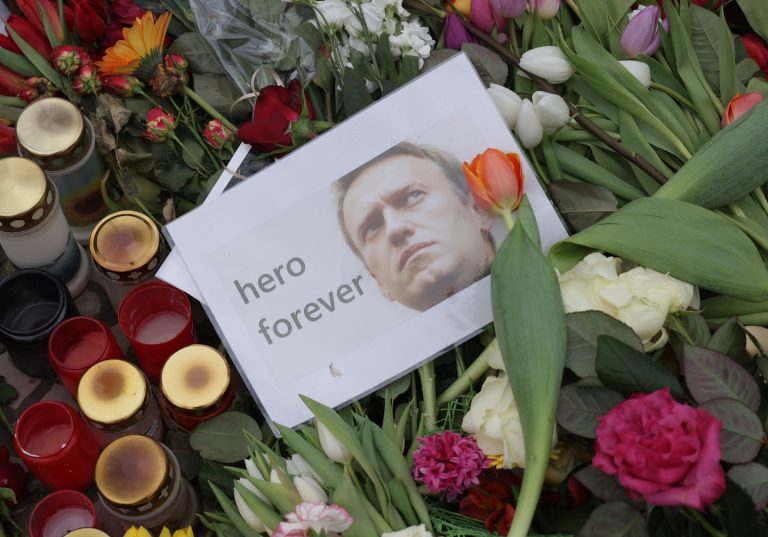Pevchikh claimed that Russian oligarch Roman Abramovich, who played a role in previous exchanges involving Russian and Ukrainian prisoners of war, raised the idea of swapping Navalny for Vadim Krasikov, a convicted Russian murderer serving a life sentence in Germany, with Russian President Vladimir Putin. .
“Putin was clearly told that the only way to get Krasikov was to exchange him for Navalny,” she said, adding that the Russian president could not accept Navalny’s release.
Instead, he decided that “since they're willing to trade Krasikov in principle, I just need to get rid of the bargaining chip, and then offer someone else when the time comes.”
The Russian investigation into Navalny's death concluded last week that he died of “natural causes,” and the Kremlin sharply criticized Western leaders for holding Putin responsible.
At Krasikov's trial, German prosecutors said he was acting on orders from Russia's Federal Security Service, or FSB, when he shot and killed the former Chechen rebel, Zelimkhan Khangoshvili, in a Berlin park in broad daylight in 2019.
Pevcikh did not specify the identity of the Americans who would be included in the exchange. But Putin hinted in a recent interview with Tucker Carlson, the former Fox News host, that he would be willing to trade Wall Street Journal reporter Evan Gershkovich, who was arrested last March and accused of espionage, for Krasikov, whom he described as acting on principle. “Espionage.” “National” motives.
Gershkovitch, his employer and the State Department have strongly denied the Russian accusations against him. State Department officials also sought the release of Paul Whelan, a former US Marine who was convicted of espionage in 2020 and is currently serving a 16-year prison sentence in Russia.
Pevchikh said she and other members of Navalny's team, based outside Russia, had been striving for at least two years to rescue the opposition leader through a prisoner exchange on humanitarian grounds. She said Western officials initially lacked the political will or desire to help.
“It could and should have happened. Navalny was supposed to be released in the coming days, because we had reached a decision on his release,” she added. “I received confirmation that the negotiations were in their final stage on the evening of February 15. On February 16, Alexei was killed.
According to her, members of Navalny's team, fearing for his life after the Russian invasion of Ukraine two years ago, realized that they had to find a way to free Navalny from prison.
“Swapping was one obvious way to save him, but at first the task seemed impossible,” she said. Pevchikh said his team made hundreds of phone calls and dozens of trips to try to make an exchange, but sometimes waited weeks for responses.
“American and German officials nodded in understanding, said how important it was to help Navalny and the political prisoners, shook hands, promised and did nothing.” She said Navalny's team continued to work to convince influential people to persuade Western politicians to take the necessary measures.
“There were people who helped a lot,” she said, adding that they did not wish to reveal their names.
On Monday, Navalny's team published a notice asking for help in finding a hall where Navalny's body could be placed for a public farewell ceremony later this week, as is customary for Russian public figures, politicians and celebrities.
His mother said she wanted the farewell and funeral ceremonies to be held in Moscow.
On Saturday, Russian investigators handed Navalny's body over to his mother, Lyudmila Navalnaya, according to Ivan Zhdanov, director of the Anti-Corruption Foundation, after she struggled with Russian officials for eight days to recover it.
Navalnaya said last week that Investigative Committee officials pressured her to agree to a private burial at an unannounced time or else they would allow her son's body to decompose. On Friday, officials gave her a three-hour ultimatum to agree, warning her that if they did not do so they would bury Navalny in the prison colony, according to Zhdanov.
Kremlin spokesman Dmitry Peskov on Monday described allegations of pressure on Navalny's mother to bury him privately as “ridiculous.”
The Kremlin has nothing to do with this. Naturally, there can be no pressure from the Kremlin. This is another ridiculous statement from before [Navalny’s] His followers,” he said, adding that “almost all of them” are on the Russian list of wanted criminals.
Last week, nearly 100,000 Russians signed a petition demanding that Navalny's body be handed over to his mother, and dozens of actors, writers, activists, journalists, and celebrities also recorded video clips demanding this.

